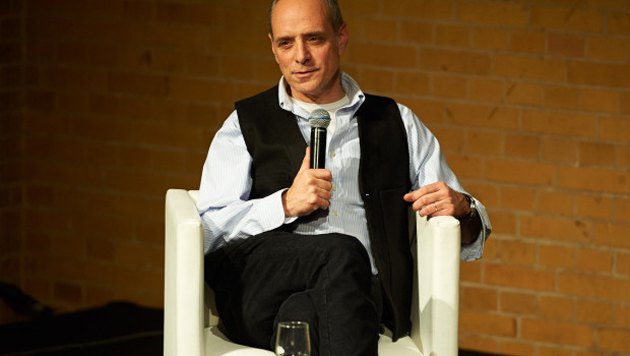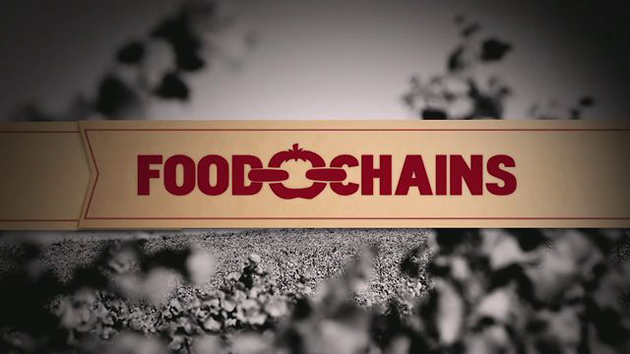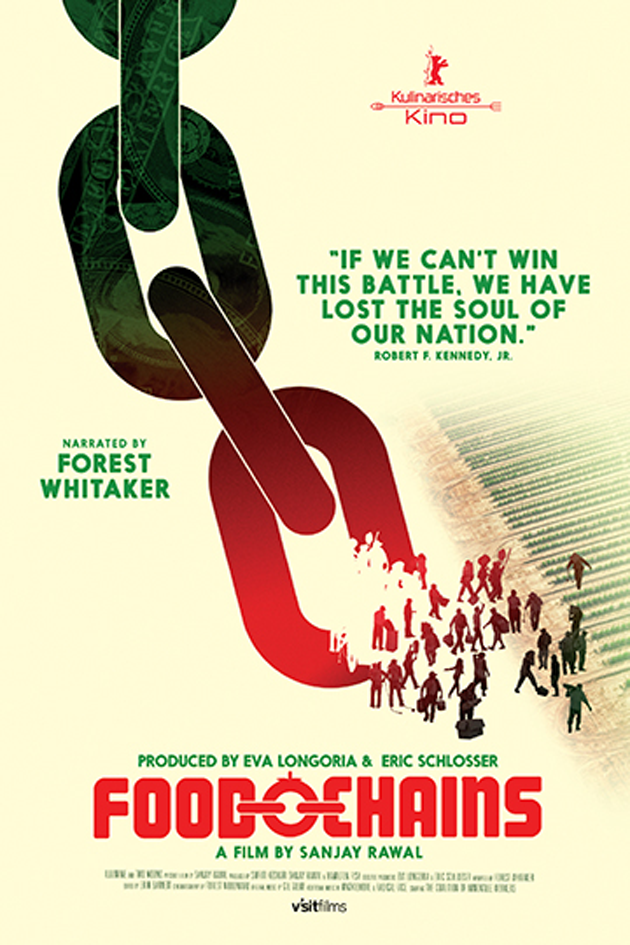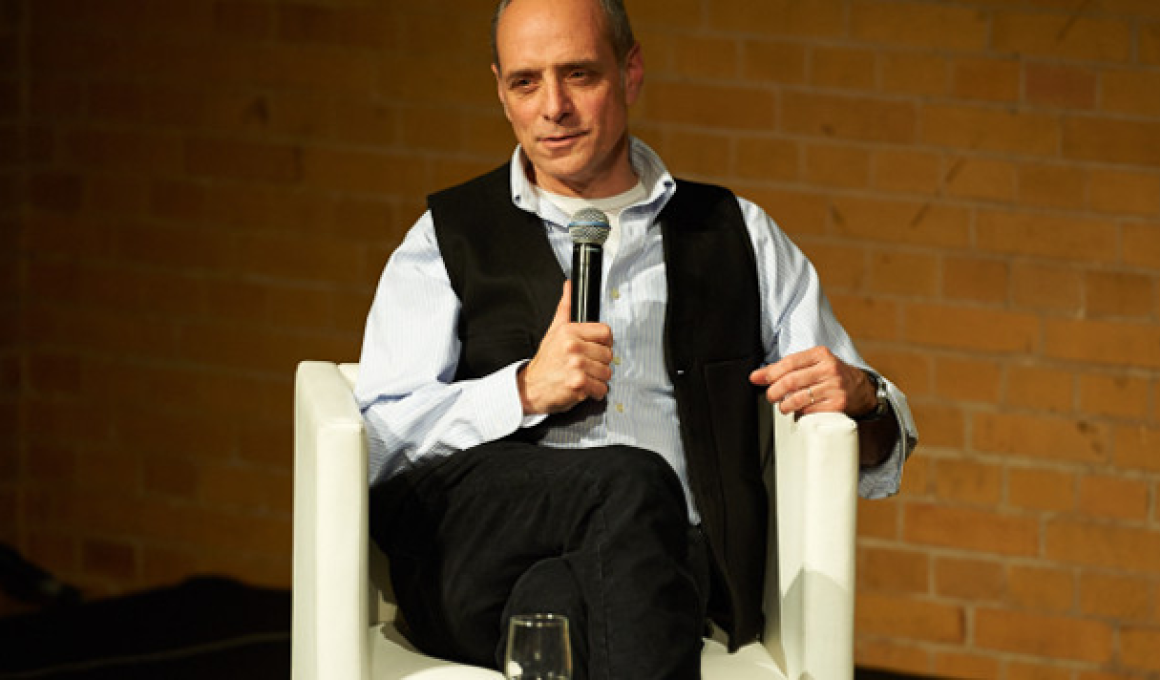Eric Schlosser: "Το Food Chains μπορεί να αρχίσει μια επανάσταση για τα δικαιώματα των εργατών αγροτών"

Συνέντευξη με τους Eric Schlosser και Smriti Keshari στην Εύη Αβδελίδου
¨Από την αρχή είχαμε στόχο να επηρεάσουμε σε παγκόσμιο επίπεδο”
Η Berlinale φέτος μας επεφύλασσε μία ιδιαίτερα σημαντική συνάντηση με τους συντελεστές του ντοκυμαντέρ Food Chains του Sanjay Rawal, το οποίο καταγγέλλει την εκμετάλλευση και την κακοποίηση των εργατών στα χωράφια των Η.Π.Α. και εντυπωσίασε στο τμήμα Culinary Cinema. Ο Eric Schlosser και Smriti Keshari, με ρόλο κλειδί στην έρευνα και στην παραγωγή του φιλμ, μας διαφώτισαν σχετικά με το ακανθώδες αυτό ζήτημα, εξηγώντας με λεπτομέρεια τη συμβολή του καθενός στο εγχείρημα της ταινίας αλλά και της δράσης της Fair Food, οργάνωσης που προστατεύει τα δικαιώματα των εργατών και που πέτυχε συμφωνίες υπέρ τους με μεγάλες δυνάμης στο χώρο των προϊόντων διατροφής. Επίσης μιλήσαμε για την αποφασιστική συμβολή της Eva Longoria στην προώθηση του φιλμ και των σχετικών δράσεων αλλά και συγκρίναμε την κατάσταση των εργατών στις Η.Π.Α. με τις Βαλκανικές χώρες. Η αφοσίωση και το πάθος των δημιουργών να ευαισθητοποιήσουν το κοινό παγκοσμίως εμπνέει για μία επανάσταση, που μπορεί κάλλιστα να αρχίσει με ένα τέτοιου μεγέθους ντοκυμαντέρ.
Σχετικά με το πόσο διαφορετική είναι η φετινή εμπειρία της συμμετοχής του Eric Schlosser στη Berlinale από την αντίστοιχη με το “Food, Inc.”
Eric Schlosser: Είμαι πολύ περήφανος για το “Food, Inc.”, αλλά το τωρινό φιλμ ασχολείται με το κομμάτι εκείνο του συστήματος διατροφής για το οποίο νοιάζομαι περισσότερο. ΄Αρχισα την έρευνά μου για τη διατροφή 20 χρόνια πριν και παρακολούθησα την περιπέτεια των εργατών στις φράουλες στην Καλιφόρνια, τότε έγραψα πρώτη φορά για το φαγητό. Είναι πολύ δύσκολο να κάνεις τους ανθρώπους να σκεφτούν για τους εργάτες στα χωράφια. Στις Η.Π.Α. σχεδόν όλοι είναι λατινοαμερικάνικης καταγωγής και υπάρχει ακόμη μεγάλη δόση ρατσισμού, έτσι είναι πολύ εύκολο να κάνεις ανθρώπους να σκεφτούν “τι κάνει ένα χάμπουργκερ στο σώμα μου” αλλά πιο δύσκολο σεχτικά με το τι κάνει το σύστημα στους πιο φτωχούς ανθρώπους των Η.Π.Α. Έτσι, όταν η Smriti και ο Sanjay αποφάσισαν ότι ήθελα να κάνουν αυτό το φιλμ ενθουσιάστηκα επειδή επιτέλους κάποιος θα επικεντρωνόταν στο πιο σημαντικό – για μένα- κομμάτι του προβλήματος και το έκαναν με έναν τρόπο που δεν ήταν απλώς ειλικρινής, αλλά και με σκληρή δουλειά. Σκληρή δουλειά στα γυρίσματα και στην έρευνα με τα βιβλία και στα χωράφια με αυτούς τους εργάτες. Η Smriti και ο Sanjay έκαναν πολύ καλό σχεδιασμό και έμαθαν με τα ίδια τους τα μάτια για το θέμα, όχι απλώς διαβάζοντας γι αυτό.
Σχετικά με την επιλογή του θέματος του “Food Chains” και τη σχετική προηγούμενή τους γνώση
Smriti Keshari: Η επιλογή έγινε λόγω του Sanjay Rawal, του σκηνοθέτη. Προέρχεται από αγροτική οικογένεια, ο πατέρας του είναι καλλιεργητής ντομάτας και έτσι ο Sanjay συχνά παρευρισκόταν σε συγκεντρώσεις εργατών στην Καλιφόρνια και στη Φλόριντα. Στην αρχή, όπως όλοι μας, ενδιαφερόταν για το φαγητό με τον τρόπο που συνηθως όλοι το κάνουμε, σκεπτόμενος: “Είναι βιολογικό, πώς με επηρεάζει αυτό;”, αλλά χωρίς πραγματικά να προβληματίζεται για ο,τι υπάρχει πίσω από την αγορά. Έτσι, οδηγώντας στη Φλόριντα, πολύ κοντά στο Immokalee, πρόσεξε για πρώτη φορά εργάτες στα χωράφια. Εκεί άρχισαν όλα, προσπαθούσε να καταλάβει τη μεταχείριση που γινόταν στους εργάτες και τον τρόπο που ήταν μέρος όλου του συστήματος. Ως θαυμαστές της δουλειάς του Eric και του Barry Estabrook για τις ντομάτες, μπήκαμε στη διαδικασία να καταγράψουμε τις ιστορίες των εργατών και να συνδέσουμε όλους μαζί τους ρόλους που ο καθένας έπαιζε ως προς το τρόπο που αυτό το τμήμα των εργατών συνδέεται με την ευρύτερη αγορά, το πώς δουλεύουν τα συνδικάτα και το ρόλο που παίζουν τα σουπερμάρκετ και οι διανομείς, ώστε να καταλάβουμε όλη την υποδομή. Ο Sanjay Rawal με πήρε τηλέφωνο, γνωριζόμαστε, είμαστε και οι δύο σκηνοθέτες από τη Νέα Υόρκη, είμαστε σε ένα μικρό συνεργείο τρία χρόνια πριν. Έτσι άρχισε και προσθέσαμε τις ιστορίες που βρήκαμε στο χωράφι. Προσπαθήσαμε να πάρουμε άδεια απ'όλους για να μπούμε στο χωράφι τους και κανείς δε μας το επέτρεπε, αλλά τρυπώσαμε σε πολλές φάρμες. Ευτυχώς οι φάρμες είναι πραγματικά μεγάλες και είναι πολύ εύκολο να χαθείς και να ζητήσεις άδεια για 20 λεπτά, που είναι αρκετός χρόνος για γύρισμα. Έτσι, πήραμε αρκετό υλικό και μετά όλη η δουλειά μας, τα γυρίσματα και οι συζητήσεις μας με τους εμπλεκόμενους μας οδήγησε στην Ένωση των Εργατών του Immokalee, μία μικρή ομάδα εργατών από τη Florida που έχει δημιουργήσει αυτό τον επαναστατικό τρόπο σκέψης σχετικά με τα δυναμικά στη γεωργία. Θεωρούν τα σούπερμάρκετ και τους προμηθευτές υπευθύνους για όλη τη συμπεριφορές στην αλυσίδα διανομής.
Eric Schlosser: Τι γνώσεις είχες σχετικά με τα επίπεδα φτώχειας όταν πήγες στα χωράφια της Florida, ποιά ήταν η βάση σύγκρισης για σένα; Επειδή ξέρω ότι κάνεις διεθνή ταξίδια, είμαι περίεργος ποιά ήταν τα συναισθήματα και οι σκέψεις σου την πρώτη φορά που πήγες στα χωράφια;
Smriti Keshari: Πολύ καλή ερώτηση.
Eric Schlosser: Ευχαριστώ
Smriti Keshari: Κερδίζω χρόνο. Γεννήθηκα στην Ινδία και έχω περάσει αρκετό χρόνο στο Puerto Rico και σε άλλες ισπανόφωνες χώρες. Προερχόμενη από την Ινδία και ζώντας κοντά σε φάρμες, νομίζω ότι ήξερα πώς μοιάζει ο κόσμος της φτώχιας, όταν αναμειγνύεται με την καθημερινή ζωή θεωρείς ότι απλώς έτσι είναι τα πράγματα. Αυτό που με σόκαρε ήταν όταν είδα τις Η.Π.Α., δεν είναι κάτι που απλώς σκέφτεσαι, θεωρείς ότι υπάρχει ένα όριο στον τρόπο που συμβαίνουν αυτά τα πράγματα και κανείς δε θεωρεί τις Η.Π.Α. Ως ένα τόπο όπου υπάρχουν τέτοια προβλήματα. Όμως υπάρχουν ομοιότητες σχετικά με τον τρόπο που οι άνθρωποι ζουν δίπλα στο ποτάμι, χωρίς να έχουν δυνατότητα για στέγη.
Σχετικά με το αν και πώς το “Food Chains” λειτούργησε ενισχυτικά για την ανάπτυξη του project “Fair Food”
Smriti Keshari: Αυτή η ερώτηση με ενθουσιάζει, γιατί στην αρχή της παραγωγής συστήσαμε τη CIW και το Πρόγραμμά τους Fair Food στη Walmart. Η διασύνδεση έγινε σε ένα συνέδριο στο Dallas. Ύστερα η Walmart ενδιαφέρθηκε για το Fair Food και το χρησιμοποίησα αυτό, οπότε κάνανε διαπραγματεύσεις με τη CIW, σχετικά με πολλά είδη κακουχιών, προσπαθώντας να βρεθεί ένας τρόπος συνεργασίας. Πιστεύω στο τέλος η Walmart πραγματικά ενεργοποιήθηκε και χρησιμοποιήσαμε αυτή τη δύναμη στο γύρισμα, καθώς και την πίεση που ασκήσαμε, του τύπου “σας έχουμε έτσι κι αλλιώς”. Νομίζω ότι η δύναμη ανθρώπων όπως ο Eric και η Eva (με 6.000.000 followers), αυτό το φιλμ που σου ανοίγει τα μάτια σχετικά με τη βιομηχανία των σούπερ μάρκετ, προφάνώς όλη η εντυπωσιακή δουλειά της CIW, η αξιοπιστία του προγράμματός της, είναι ο μόνος τρόπος διασφάλισης δίκαιης μεταχείρισης για τους εργάτες, καθώς και βιώσιμων μισθών. Εδώ και τρεις εβδομάδες η Walmart υπέγραψε συμφωνία με τη CIW.

Σχετικά με την εμπλοκή της Eva Longoria στο project
Eric Schlosser: Η Eva Longoria είναι περισσότερο γνωστή ως ηθοποιός, αλλά έχει επίσης μεταπτυχιακό στις Μεξικανικό-Αμερικανικές σπουδές (Chicano studies) και τώρα δουλεύει το διδακτορικό της. Είναι μία πολύ ευφυής, υπέροχη γυναίκα και πολύ ευαίσθητη σε θέματα ρατσισμού και μετανάστευσης, επειδή η οικογένειά της βρίσκεται στις Ηνωμένες Πολιτείες εδώ και 400 χρόνια, πολύ πριν υπάρξουν οι Η.Π.Α., και έτσι έχει ένα μακρόχρονο ενδιαφέρον για θέματα σχετικά με μετανάστευση και ρατσισμό απέναντι στους Λατίνους. Είχε γίνει παραγωγός σε ένα άλλο φιλμ για εργάτες σε χωράφια, περίπου 4 χρόνια πριν, για τα παιδιά των εργατών και πώς αυτά χρησιμοποιούνται εκεί, τη συνάντησα σε μία εκδήλωση σχετικά με αυτό το φιλμ. Μετά γνώρισα το Sanjay και τη Smriti και είδα τη δουλειά που έχουν κάνει για το φιλμ τους, τους έφερεα σε επαφή με την Eva και την υπέροχη οργάνωση της MALDEF, η οποία παλεύει ενάντια στις διακρίσεις απέναντι στους Μεξικανούς και στους Μεξικανο-Αμερικάνους. Είναι παρόμοια με το κίνημα του 1960 NAACP, με το οποίο συνεργάστηκε ο Luther King, διαδραματίζει τον ίδιο ρόλο τώρα. Υπάρχει έντονος ρατσισμός απέναντι στους Μεξικανούς και στους Μεξικανο-Αμερικάνους στις Η.Π.Α. Και πολλοί άνθρωποι που συχνάζουν στα σαλόνια τσαγιού και είναι κατά της μετανάστευσης θέλουν να χτίσουν ένα τείχος ανάμεσα στις Η.Π.Α. Και στο Μεξικό, την ίδια στιγμή που νομίζω ότι υπάρχει μία αναπτυσσόμενη γωνή για τους Λατίνους και την κουλτούρα τους στην πολιτική. Ο Diego Luna έκανε ένα φιλμ για τον Cesar Chavez, που υπήρξε ο Martin Luther King της Μεξικανο-αμερικανικής κοινότητας. Νομίζω το “Food Chains” είναι μέρος αυτού του αναπτυσσόμενου κινήματος, λέει ότι κάποια είδη διακρίσεων είναι απαράδεκτα, είναι ένα κίνημα για τα ανθρώπινα δικαιώματα του 21ου αι. με πολλούς τρόπους.
Σχετικά με το πώς πείστηκαν οι εμπλεκόμενοι στο project να συνεργαστούν
Smriti Keshari: Δεν υπήρξε κάποια στρατηγική. Πολλοί άνθρωποι είχαν σύνδεση με το θέμα με τον ένα τρόπο ή με τον άλλον, ή είχαν βαθύ ενδιαφέρον να μάθουν παραπάνω, αλλά νομίζω υπήρχε ομοιότητα στον τρόπο που αισθανόμασταν ο Sanjay κι εγώ ότι υπήρχε έλλειψη κατανόησης σχετικά με το ότι συνέβαινε όλο αυτό, και αυτός ήταν και ο στόχος μας εξ' αρχής, να είμαστε πραγματικά ικανοί να συνδέσουμε τις τελείες, έτσι η ομάδα της παραγωγής οδηγήθηκε και επηρεάστηκε από αυτό.
Σχετικά με ενδεχόμενες προτάσεις για το πώς να τεθεί το ζήτημα των εργατικών δικαιωμάτων σε μικρές χώρες όπως η Βουλγαρία ή η Ελλάδα σε διεθνές επίπεδο.
Smriti Keshari: Θα ήθελα να μάθω περισσότερα για το τι συμβαίνει στη Βουλγαρία, για παράδειγμα, γιατί σε κάθε χώρα υπάρχουν διαφορετικά είδη συστημάτων εξουσίας που εξηγούν τον τρόπο με τον οποίο γίνεται η χρησιμοποίηση και η εκμετάλλευση των ανθρώπων. Έτσι, στις Η.Π.Α. Σήμερα είναι σαφές το πού εδράζει η δύναμη με βλαβερό τρόπο σε κάθε τομέα της οικονομίας, και δεν είναι στο Λευκό Οίκο. Έτσι, κοιτάζοντας την κατάσταση σχετικά με τους ανθρώπους με χαμηλό εισόδημα στις Η.Π.Α., χρειάζεται να δεις τα δυναμικά συνεργασιών. Βρίσκεις ξανά και ξανά το ρατσισμό, είναι πολύ σημαντικό στοιχείο, επειδή οι άνθρωποι είναι πρόθυμοι να ανεχτούν ένα ορισμένο είδος συμπεριφοράς απέναντι σε άλλους που είναι κατώτεροι από ανθρώπους που είναι επικεφαλής. Πιστεύω πραγματικά πως αν οι εργάτες στις φάρμες σήμερα είχαν μπλε μάτια δε θα ανεχόμασταν τέτοιες συμπεριφορές. Στην Ιαπωνία, οι άνθρωποι που εργάζονται στη συσκευασία κρεάτων θεωρούνται “ακάθαροι”, είναι μία άλλη κάστα, ξεχωριστή, “κατώτερη”.
Eric Schlosser: Στις Η.Π.Α. Η εκμετάλλευση των εργατών είναι πολύ έντονα συνδεδεμένη με το αυξανόμενο χάσμα ανάμεσα στους πλουσίους και τους φτωχούς. Αν κοιτάξει κανείς τους κατώτερους μισθούς στις Η.Π.Α. Στα τέλη του '60 και στις αρχές του '70, ήταν 30-33% υψηλότεροι απ' ο,τι σήμερα. Αυτό σημαίνει ότι οι φτωχότεροι άνθρωποι στις Η.Π.Α. Έχουν υποστεί μείωση των μισθών τους κατά το ένα τρίτο τα τελευταία 30 με 40 χρόνια. Και όταν βλέπεις τους εργάτες στη Φλόριντα, τις συνθήκες κάτω από τις οποίες ζουν, θα μπορούσε να είναι οποιοσδήποτε εργάτης στις Η.Π.Α., οι εταιρίες τους χειρίζονται επειδή εκείνοι δεν έχουν εκπροσώπηση, ούτε δύναμη και υπάρχουν διακρίσεις εναντίον τους. Αλλά για μένα έχει ενδιαφέρον να βλέπεις τους πιο φτωχούς εργάτες της Αμερικής γιατί σου λέει πολλά για το σύστημα. Αν έβλεπες τους ίδιους φτωχούς εργάτες το 1969 ή το 1970, θα έβλεπες τεράστια αισιοδοξία, θα έβλεπες το Cesar Chavez να κερδίζει μία νίκη μετά την άλλη και μία εθνική πεποίθηση ότι τέτοιου είδους πράγματα είναι απαράδεκτα. Αλλά μετά στη δεκαετία του '80 έχουμε την εποχή Reagan, εποχή εγωισμού και απληστίας, που έδινε αξία στον πλούτο και τα χρήματα και ξεχνούσε τους ανθρώπους στα χαμηλότερα στρώματα. Και το γεγονός τους Μαίου και ο τρόπος που έγινε και το γεγονός ότι έρχεται πάλι στη επικαιρότητα ο Chavez, αλλά και η έκταση του ντοκυμαντέρ που παίρνει μέρος σε όλο αυτό, για μένα είναι δείγμα απαρχής ενός πραγματικού κινήματος, και μία έκφραση του ότι αυτό φτάνει πια σε μία κρίσιμη μαζικότητα. Ίσως λοιπόν να κάνω λάθος, αλλά πιστεύω ότι το φιλμ θα έχει αντίκτυπο στο να προχωρήσουν τα πράγματα με τρόπο που δεν έχουμε ξαναδεί. Αν δείτε το οπτικό υλικό από τον Cesar Chavez στη δεκαετία του 1960, ο,τι συνέβαινε ήταν τεράστιο. Ένα τελευταίο πράγμα για το φιλμ, έχει τόσους ανθρώπους στην εκτέλεση παραγωγής γιατί ήταν πάρα πολύ δύσκολο να συγκεντρωθούν τα χρήματα. Η Smriti και ο Sanjay εργάστηκαν σκληρά για τόσα χρόνια, χωρίς χρήματα, για τους σωστούς λόγους.

Σχετικά με τον τρόπο που θα διαδοθεί το “Food Chains”
Smriti Keshari: Είχαμε επικεντρωθεί στον αντίκτυπο από την αρχή, γι αυτό και συναντηθήκαμε με τη CIW, ήταν η λύση μας, γιατί εκείνοι διέθεταν από την αρχή ένα μοντέλο που είναι αποδεδειγμένο και δουλεύει σε αυτό τον τομέα, επηρεάζοντας τους αγρότες στα χωράφια άμεσα. Έτσι, όλος μας ο αντίκτυπος έγκειται στο να προωθούμε του μοντέλο τους. Έχουμε δρομολογήσει συνεργασίες, με 20-25 Ιαπωνικούς οργανισμούς στις Η.Π.Α., και υπάρχει μεγάλο ενδιαφέρον και από την Ευρώπη, επίσης, ως προς το να γίνει ενημέρωση πάνω σε αυτά τα ζητήματα, αλλά και υποδείξεις σχετικά με το πώς διαφορετικές ομάδες (καταναλωτές, μητέρες, φοιτητές) μπορούν να εμπλακούν με το θέμα και να κάνουν τις σωστές ερωτήσεις. Εξαρτώμαστε από το πότε θα βγει το φιλμ, από εκεί αρχίζει ο αντίκτυπός μας.
Eric Schlosser: Είπα στη Smriti και το Sanjay να ετοιμαστούν να επισκευτούν όλα τα κολλέγια των Η.Π.Α. Με αυτό το φιλμ. Είναι μόνο 8.000, αλλά έχουμε χρόνο.
Σχετικά με τις πηγές για τη σεξουαλική εκμετάλλευση των γυναικών στα χωράφια.
Smriti Keshari: Ήταν από το Ηuman Rights Watch; Πρόκειται για το 80% των γυναικών, και είναι μόνο όσες έχουν αναφερθεί, οπότε αυτό είναι κάτι, γίνεται καθημερινά όχι μόνο από τους επιβλέποντές τους αλλά και από τους συναδέλφους τους. Έτσι, επικεντρωθήκαμε εκεί, να δούμε πώς μπορούμε να ενδυναμώσουμε τις γυναίκες ώστε να είναι ικανές να παραπονεθούν, να μη φοβούνται πως θα χάσουν τη δουλειά τους, γιατί με τις γυναίκες δεν υπάρχει μόνο ή ευθύνη του να φέρνουν ένα έξτρα ειδόδημα στο σπίτι αλλά και η φροντίδα της οικογένειας, και πολλές φορές ανέχονται τη συμπεριφορά αυτή γιατί είναι η μόνη τους η επιλογή. Γυρνώντας στο προηγούμενο ερώτημα για το πώς μπορούμε να αλλάξουμε τα πράγματα, είναι σημαντικό να υπάρχει ένα σύστημα το οποίο δίνει φωνή στους εργάτες, που να επιβλέπεται από τους ίδιους, γιατί κανείς άλλος δε θα φροντίσει τα δικαιώματα των πιο ευάλωτων και απελπισμένων ανθρώπων, είτε πρόκειται για μετανάστες σε άλλες χώρες είτε πρόσφυγες.
Σχετικά με τη διανομή του “Food Chains” στην Ευρώπη.
Smriti Keshari: Κάνουμε σχετικές συζητήσεις, χτες ήταν η πρώτη μας προβολή, η παγκόσμια πρεμιέρα μας και υπάρχουν εξαιρετικοί ατζέντηδες, έχουμε συναντήσεις την ερχόμενη εβδομάδα, όλα πάνε πολύ καλά και ελπίζουμε μέσα στον επόμενο μήνα να υπογράψουμε με κάποιους.
Για τα επόμενα βήματα του Eric Schlosser, έχοντας ασχοληθεί με τόσες διαφορετικές πλευρές των θεμάτων διατροφής.
Eric Schlosser: Νιώθω ότι προς το παρόν η εμπλοκή μου με το φιλμ αυτό θα είναι η ολοκλήρωση της εμπλοκής μου στα θέματα διατροφής για λίγο. Όταν πρωτοέγραψα το “Fast Food Nation”, εκδόθηκε για πρώτη φορά στο “Rolling Stone”, και από τότε αυτό το τεράστιο κίνημα διαμορφώθηκε στις Η.Π.Α. Δε ζητώ τα εύσημα γι αυτό, αλλά είμαι πολύ χαρούμενος που συνέβη και που τόσοι καλοί συγγραφείς και σκηνοθέτες δεσμέυτηκαν στο θέμα, πια δε νιώθω κύριο πρόσωπο σχετικά με όλο αυτό. Το βιβλίο μου που εκδόθηκε φέτος ασχολείται με την απειλή των πυρηνικών όπλων και το επόμενό μου θα είναι για τις φυλακές. Προσπαθώ να βρώ πράγματα που είναι κακά για σας και να τα εκθέσω ώστε να αποφύγετε τέτοιου είδους προβλήματα. Αλλά πιστεύω ότι πολλοί μιλούν με αξιόλογο τρόπο για τα θέματα διατροφής πια, όπως η Smriti και ο Sanjay, και ότι θα περάσουν τα επόμενα πέντε χρόνια να συζητούν αυτά τα θέματα, κάτι που θα έχει μεγάλη ανταπόδωση.

Interview with Eric Schlosser and Smriti Keshari
“Global impact was our purpose form the beginning”
We had the pleasure to discuss with Eric Schlosser and Smriti Keshari, who had a key-role in the production of “Food Chains”. A really important documentary, both politically and socially, by Sanjay Rawal, that impressed this year's Berlinale (Culinary Cinema Section), created with passion, with the aim to inform and motivate the public in a universal level, about invredibly low wages of farmer workers-especially immigrants, and their possible molest in work environment, encouraged by a chain of intermediates with final recipient big supermarket companies. They gave us an eye-opening image about the issue, explaining in detail each one's particular contribution to research and promotion of the film, as well as Eva Longoria's involvment to the project and how Fair Food works, along with comparisons οf the situation in USA to Balcan. Creators engagement to their goal to spread the word about the worker''s rghts protection was deeply inspiring and a big step of empowering such fair fights.
About how different from “Food, Inc.” is for Eric Schlosser this year's participation in Berlinale
Eric Schlosser: I am very proud of “Food, Inc.”, but this film is really about the part of food system that I care most about. When I first started doing my research on food it was almost 20 years ago and I followed the harvest with the strawberry workers in California and that was the first writing I did about food. It’s very difficult to get people to think about farm workers; in the United States almost all are Latino and there is still a fare amount of racism and so it’s very easy to get people to think about “what is my hamburger doing to me?” and it’s more difficult to get people to think about what is the system doing to the poorest people in the United States. So, when Smriti and Sanjay decided that they wanted to do this film I was very excited because somebody was finally going to focus on –to me– the most important part of the problem and they did it in a way that wasn’t just sincere, but they did a very hard work; and the hard work is at the filming and the hard work is at the research in books, the hard work is to spend time in the fields with these workers. Smriti and Sanjay did a great plan and learned about it by seeing with their own eyes, not just reading about it.
About choosing the subject of “Food Chains” and their relative previous konowledge
Smriti Keshari: It actually started with Sanjay; Sanjay Rawal is the director and his family’s background is in agriculture, his dad is a tomato grader, so he often attends conferences with his dad and so he spends a lot of time in California and Florida. The way he always tells a story is that he very much, like a lot of us, cares about food in the way that we typically do, thinking about it, “Is it organic, how is it effecting me?”, but not thinking really beyond that, thinking beyond this market, beyond the farmers’ market. So, he was driving to Florida, very close to Immokalee, and noticed for the very first time workers out in the field; that’s kind of where it started all, he was trying to understand how farm workers were being treated and how they were part of the whole system. So, being a fan of Eric’s work, being a fan of Barry Estabrook’s about tomato, we set out to capture the stories of farm workers and to really connect the dots of how everyone played together, how that department of labor is attached to it and how the unions work and how the supermarkets were a part of it, how distributors work, to really understand the whole infrastructure. He called me, we knew each other, we’re both film makers from New York, we got a small crew of people just three years ago; that’s how it started, and we added the stories that we found in the field. We tried to get permission from everyone to enter their fields and no one would allow us, so we snuck into a lot of farms; luckily farms are really big, so it’s easy to get lost and it’s easy to take 20 minutes to ask for permission, which is enough time to shoot also. So that’s how we captured a lot of the footage and then all our work, all our filming and all our discussions with farm workers and farm worker organizations on the problems kept leading us to the solution and the solution kept pointing us to the Coalition of Immokalee Workers, which is a small group of farm workers from Florida that have really created this revolutionary way of looking at where the power dynamics lie in agriculture; they hold supermarkets and food retailers responsible for all the behavior that’s happening throughout their supply chain.
Eric Schlosser: I don’t want to take over your job, but I am the person for you. How much experience or first time knowledge did you have of rural poverty when you went into the fields in Florida, what was the basis of comparison for you of what you might have seen elsewhere before? Because I know you travel internationally, so I’m just curious what your feelings and perspective were when you first went in the fields.
Smriti Keshari:That’s a really good question.
Eric Schlosser: Thank you.
Smriti Keshari: I’m buying myself time. I was actually born in India and I’ve spent a lot of time in Puerto Rico and other Spanish speaking countries; and coming from India and actually living close to farms in India, I think I knew what world poverty looks like when it’s intermixed with everyday life, that you think of it like that’s just the way that things are. But what’s really shocking to me was seeing the United States; it’s just not something that you think of, you often think that these things are happening beyond a border and no one looks at the United States as where these problems exist. So, there are similar ways, I mean seeing how people are living by the river, not having access to housing; those were just some of the hints for a start.
About if and how “Food Chains” worked as an accelerator to the development of the “Fair Food” project
Smriti Keshari: Well, this question is actually really exciting, because early on in the production we introduced the CIW and their Fair Food Program to Walmart. We made the connection at a conference in Dallas. Then Walmart was interested in the Fair Food Program and I could use the help, so they had been in negotiations with the CIW, and the CIW had to deal with a lot of the hardships of those conversations, or trying to see if there is a way that they can work together. And I think that with Walmart at the very end it was very ‘touch and go’ and moving forward and at the very end we really used the power I think of filming and the pressure of letting them know “we are going to have you either way”. I think using the power of people like Eric and Eva –I think with six million followers– and having this film be an eye-opening look at the supermarket industry, obviously all of the amazing work of the CIW and how proven their program is and how it’s the only one to secure fair treatment for farm workers and a living wage for farm workers. So, it was exactly I think three weeks ago that Walmart signed the Fair Food agreement with the CIW.

About Eva Longoria's involvement to the project
Eric Schlosser: Eva Longoria is best known as an actress, but she’s also got a Master’s degree in Chicano studies, which is basically Mexican-American studies and she is working now for her PhD. She is a very bright, very formidable woman and she’s very sensitive on the issue of racism and immigration, because her family has been in the United States I think almost 400 years, on that land, but long before there was United States, and so she has a long-standing interest in immigration issues and issues of racism towards Latinos; she produced another film on farm workers, maybe four years ago, something like that, it’s about the children of the farm workers and how their children are being used in the fields and I met her at an event for her film on farm workers. Then, when I got to know Sanjay and Smriti and saw the work they were doing for their film, I put them in touch with Eva and with the wonderful organization of MALDEF, which is really the organization in United States that’s fighting against discrimination against Mexicans and Mexicans-Americans; it’s very similar to the civil rights movement of the 1960s, the NAACP, which one Luther King worked with, and MALDEF plays much the same role now. There is a great deal of racism towards Mexicans and Mexican-Americans in the United States and a lot of the Tea Party people are anti-immigrant and want to build a wall between the United States and Mexico and at the same time I think there is a growing voice for Latinos and culture in politics and Diego Luna has a film here about Cesar Chavez, who was the Martin Luther King of the Mexican-American community. I think the film that Smriti and Sanjay have made is part of this growing movement, it says certain sorts of discrimination are just unacceptable, this is a 21st century civil rights movement in a lot of ways. All those other executive producers are because they are very persuasive people.
About convincing all people involved in the project to work together
Smriti Keshari: There was no strategy at hand in order . No, a lot of the people who have come forward either have ties to the issue in one way or another, or really deeply care to know more, like I think there was similarity to how I felt and how Sanjay felt, there was just a lack of understanding that this was going on and that has been our goal from the beginning, to really be able to connect the dots, so the executive team has been guided and influenced by that.
About suggestions to put human rights in labor in small countries such as Bulgaria or Greece in the larger global picture
Smriti Keshari: I’d love to know more about what’s happening in Bulgaria, for instance, because in each country there are different sorts of power systems that explain how the people are used and exploited. So, in the United States today it’s very clear where the power is and how our lives with harmful corporations in every sector of the economy; the power does not lie in Washington D.C., So, in looking at the plate of low-income people in the United States, you have to look for corporate power; and in Bulgaria I’d be very curious, what has changed since the wall came down and has created this ability to exploit low-wage workers. Again and again you find racism, it is a very important component, because people are willing to tolerate a certain kind of behavior towards others who are inferior than they would to people that are in charge. I very much believe that if the farm workers in the United States today have one pair and blue eyes there’s no way that we would tolerate this sort of ideas, In Japan, people who work in meat packing and jobs that are considered “unclean” are a whole other cast, a separate cast, people who are considered “inferior”.
Eric Schlosser: In the United States this exploitation of farm workers is very much connected to the rising gap between the wealthy and the poor. If you look at what the minimum wage was in the United States in the late 1960s and early ‘70s, it was about 30-33% higher than today, so what that means is that the poorest people in the United States have had their wages cut by a third in the last 30-40 years; and when you see the farm workers in Florida, the conditions they live in, that could be any worker in the United States if these companies could get away with farm workers because they have no representation, they have no power and they’re discriminated against. But to me it’s interesting to look at the poorest workers in America, because it tells you a lot about the system. If you looked at the same poor workers in 1969 or 1970, you would have seen enormous optimism, you would have seen Cesar Chavez winning one victory after another and a kind of national, across the United States, belief that this sort of thing is unacceptable. But then in the ‘80s we got the Reagan era of selfishness and greed and a culture that just valued, celebrated, the rich and the money of the rich and forgot about people at the bottom; and the fact that this comes in May and the way it’s been made and the fact that Chavez again is coming out, to me Smriti and Sanjay are sort of part of the beginnings of a real movement and in expression that the movement is now reaching in a certain critical mass. So, I could be wrong, but I think their film is going to have an impact on the culture of pushing this forward in a way that we haven’t seen. If you see that footage of Cesar Chavez of the 1960s, that was huge; again, he was not as famous as Martin Luther King, but just right below and I would be surprised if Lucas Benitez who was there last night emerges as a major national figure in the same way. One last thing about the film would be that there are so many executive producers because it was so hard to raise the money and it wasn’t just Sanjay’s mother 9that was a joke!) last night. These two have worked so hard for years, for no money, for all the right reasons.
About the strategy to have “Food Chains” circulated and shown
Smriti Keshari: The impact has actually been our focus from the beginning as well, and that’s why when we met with the Coalition it was like the solution, because they already have a model that is proven and that works in that, that effects farm workers immediately. So, all of our impact is on promoting their model; we have partnerships lined up, about 20 to 25 Japan organizations in the U.S., and there’s a lot of interest here in Europe as well of raising awareness of the issues, but also showcasing how all of these different groups –whether it’s consumers, moms, students– can get involved with the issue and how they can ask the right questions –similarly, I think the organic movement has become more prevalent, because people just demanded more from their purchase, from where they purchase food– about the farm workers and I think boycott organizations that are not participating, that are not abiding; and here’s the consumer’s power, because that’s really the only thing that motivates corporations to do the right thing and to pay attention to the script that has been affected. So, we are depending on when the film comes out; theatrically we’re launching with a full-on impact and engagement campaign.
Eric Schlosser: I told Smriti and Sanjay to be prepared to visit every college campus in the United States with this film.
Smriti Keshari: Yes, hopefully.
Eric Schlosser: It’s only 8,000, but we have time.
About the actual sources about women sex expoloitation in the fields
Smriti Keshari: That was from human rights watch; and it’s 80% of women in the fields and those are just the reported ones, so we know that there is more going on there and that’s something, talking to female farm workers is something that happens on a day to day basis, not just from supervisors but also from your male co-workers. So, that has been a lot of the focus, to look at how to empower women to be able to complain, to not fear losing their job, because with women you have the responsibility of also being the extra source of income, but also caring for your family and so often I think this type of behavior is OK because that’s the only choice. I think, going back to the question that you had asked before about how you change this, that it’s a matter of having a system that heavily gives the farm workers the voice; that’s the only solution, it’s something that’s incorporating their voice, that is monitored by them, because no one else is going to look out for the rights of the most vulnerable and desperate people, whether it’s immigrant workers in other countries, or refugees that come to other countries.
About distributing “Food Chains” in Europe
Smriti Keshari: Yes, we’re having those conversations. Yesterday was our first screening, it was our worldwide premiere and there are incredible sales agents, there are films lining up, those meetings this week, so it’s been really good and so hopefully in the next month we’ll sign with someone.
About what comes next after Eric Schlosser' covering lots of different aspects with his films of the food industry
Eric Schlosser: I feel like for the time being my involvement with this film is going to be the conclusion of my involvement in food issues for a while. When I first wrote “Fast Food Nation”, the very first publication of “Fast Food Nation” was about 15 years ago in “Rolling Stone” magazine and since then this huge food movement has arisen in the United States; I’m not taking credit for it, but I’m very happy that it’s happened and there are so many good writers and film makers engaged in this issue that I feel like I’m not an essential person in it. So, the book that I had just come out this year is on nuclear weapons and I get involved with issues regarding the threat of nuclear weapons, and my next book is on prisons; so, I’m trying to find things that are bad for you and expose them so that you can avoid some of these problems. But I feel like there are very good spokespeople on these food issues now and I think that with Smriti and Sanjay it’s terrific and I’m really hoping that they’ll spend next five years on farm worker issues, talking to people about it and it will be very rewarding. In the United States there are very well organized, well funded, animal rights groups and there are fewer human rights groups for the poor like this, anyway.
Evi Avdelidou
























ΣΧΟΛΙΑ
Εμφάνιση σχολίων